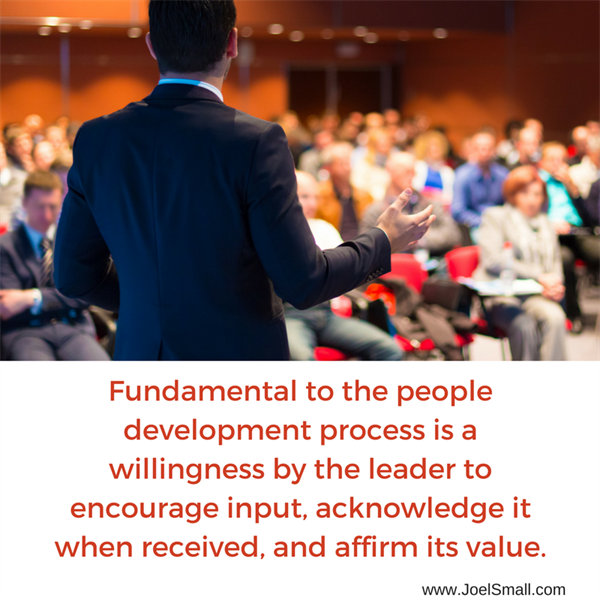I often encounter doctor clients who are frustrated by their team’s lack of ability to achieve a pre-defined, desired result. The scenario goes something like this.
Coach: I hear that you are frustrated. Give me more detail.
Doctor: Okay. Well, no matter how many times I tell my staff what I want them to do, they are unable to consistently get it right. Even worse, they are constantly coming to me with problems that they should be able to manage. It seems as if they can’t make decisions on their own. I’m too busy to keep repeating myself, and I get frustrated when they come to me needlessly to solve every simple problem. I’ve tried everything I know to change this situation, but to no avail.
Coach: Everything?? Have you tried becoming a “People Developer”?
Doctor: I don’t know what that means. Tell me more please.
 Any coach, in any industry, will recognize this scenario because the premise knows no boundaries. The good news is that, even though the problem is universal, so is the solution. The answer lies in understanding the distinction between a “problem solver” and a “people developer.”
Any coach, in any industry, will recognize this scenario because the premise knows no boundaries. The good news is that, even though the problem is universal, so is the solution. The answer lies in understanding the distinction between a “problem solver” and a “people developer.”
The doctor in the above scenario is a problem solver. By this I mean that he or she issues directives without tying them to the foundational principles of the practice. Secondly, he or she has failed to create a practice environment that is conducive to ongoing personal development. How do I know this to be true? Simple. If they had been a “people developer” they would not be plagued with these problems. As we shall see, it is the doctor, not the staff, that has created the problem.
Almost invariably, problem solvers fail to define the purpose of their directives and how the specific purpose correlates with the fundamental practice purpose and values. This is assuming that the doctor has even defined and shared these ideals with the staff. This lack of communication creates a void that is filled by each individual team member who must apply their own interpretation of purpose to any directive. Purpose is a strong determinant of action, so we can only imagine the confusion and frustration when a team with varying interpretations of purpose tries to achieve a common goal.
Furthermore, problem solvers will always be plagued with never ending questions from their team. Frankly, the problem and solution revolves around our expectations of our staff. Do we expect them to be helpless? Are we okay with their unwillingness and apparent inability to answer even the simplest of questions? I would expect that even the most devout problem solver would say “No!” and yet they fail to see that they impose the very environment that promotes these forms of learned helplessness. The more we continue to solve even the simplest of problems, the more we become entrenched in the problem solver mentality, and the more we disempower our staff, causing them to abrogate their creative abilities to solve these problems in their own.
 The answer is for us to commit to developing these God-given skills in those who serve our cause. We do this by seeking their input to creative problem solving. We do this by becoming people developers. I am reminded of the old Chinese proverb, “Give a man a fish and you feed him for a day. Teach a man to fish and you feed him for a lifetime.” And so it is with people developers. We must first believe that someone is able to fish, or in this case, solve problems on their own. Believing that something can be done will eventually become an expectation that it will be done, and expectations have been shown to be powerful, self-fulfilling prophesies.
The answer is for us to commit to developing these God-given skills in those who serve our cause. We do this by seeking their input to creative problem solving. We do this by becoming people developers. I am reminded of the old Chinese proverb, “Give a man a fish and you feed him for a day. Teach a man to fish and you feed him for a lifetime.” And so it is with people developers. We must first believe that someone is able to fish, or in this case, solve problems on their own. Believing that something can be done will eventually become an expectation that it will be done, and expectations have been shown to be powerful, self-fulfilling prophesies.
Our team looks to us for answers when we fail to develop their problem solving skills. If we find ourselves in this situation, here’s a simple solution. First, let the team know that you will be seeking their input to problem solving, then immediately quit answering questions. When someone comes to you seeking a solution to a problem, tell them that you have a solution but you would like to hear their solution first. In many cases, their solution will work quite well or will require minimal adjustments. Always make a clear correlation between the solution and the guiding practice values and purpose.
Over time, staff will realize that you will not be answering questions without their input. More importantly, they will realize that their solutions are good solutions and, with your support and encouragement, they will begin to solve problems independently within the confines of the practices purpose and values. It is important, at this juncture, to get clear regarding decisions that you feel require your input. Surprisingly, as the people development process progresses, you will find that your input is required less and less.
Fundamental to the people development process is a willingness by the leader to encourage input, acknowledge it when received, and affirm its value. People developers will tell you that they have grown to rely on their staff’s problem solving capabilities. I can tell you that I have personally observed very positive changes in practices that have developed a people development mentality.